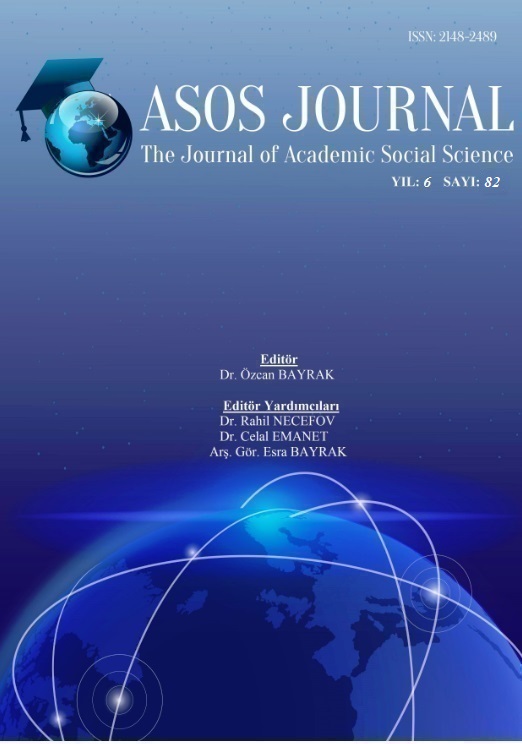YEREL YİYECEK DENEYİMİNİN DESTİNASYON İMAJI VE DESTİNASYON SADAKATİ ÜZERİNE ETKİSİ: MERSİN’İ ZİYARET EDEN YERLİ TURİSTLER ÜZERİNDE BİR ARAŞTIRMA
Author :
Abstract
Gastronomi turizminin odağında farklı yerel lezzetlerin deneyimlenmesi ve yeni tatların keşfedilmesi amacıyla yapılan seyahatler yer almaktadır. Bu araştırmada, Mersin’i ziyaret eden yerli turistlerin, yerel yiyecek deneyimlerinin destinasyon imajı algılarına ve destinasyon sadakati davranışlarına etkisi incelenmiştir. Araştırma, sınamacı ve keşfedici türde ilişkisel tarama modeliyle tasarlanmıştır. Veriler, çeşitli araştırmacıların geliştirdiği ölçeklerin bir araya getirilmesiyle oluşan bir anket vasıtasıyla toplanmıştır. Kolayda örnekleme tekniğine göre yüz yüze gerçekleştirilen anket uygulaması sonucunda kullanılabilir 410 adet ankete bir araya getirilmiştir. Araştırma amacı doğrultusunda açıklayıcı ve doğrulayıcı faktör analizlerinden ve yapısal eşitlik modeli yol analizinden yararlanılmıştır. Araştırmaya katılanlar, yerel yiyecek deneyimlerini kültürel deneyim, duyulara hitap, bireyler arası ilişki ve psikolojik rahatlama olmak üzere dört faktörde algılamışlardır. Ayrıca katılımcılar, Mersin’in destinasyon imajını; eğlence ve açık hava etkinlikleri, yiyecek çeşitliliği ve tesisler, fiyat ve değer, doğal kaynaklar, çevre, tarihi mekanlar, ulaşılabilirlik olmak üzere yedi faktörde algılamışlardır. Destinasyon sadakati ise katılımcılar tarafından tek faktörde algılanmıştır. Yapısal eşitlik modeli yol analizine göre turistlerin yerel yiyecek deneyimlerinin, destinasyon imajı ve destinasyon sadakati üzerinde olumlu bir etkisinin olduğu tespit edilmiştir. Buna ek olarak, turistlerin yerel yiyecek deneyiminin, destinasyon sadakati üzerindeki etkisinin, algılanan destinasyon imajı sayesinde anlamlı olarak arttığı tespit edilmiştir. Sonuç itibariyle, turistlerin yerel yiyecek deneyimlerinin başarısının destinasyona yönelik davranışsal eğilim göstermelerinde etkili olduğu, bununla birlikte destinasyon imajının bu eğilimi önemli ölçüde artıran bir unsur olduğu görülmüştür. Araştırma bu hususlara dikkat çeken kavramsal ve uygulamaya yönelik çıkarımlar ile son bulmuştur.
Keywords
Abstract
Travelling to explore different tastes and local flavours has gained considerable popularity in recent years. In this research, the effect of local food experience, on the perceived destination image and destination loyalty was investigated in the scope domestic tourists visiting Mersin. The research was designed as testing and the exploratory type of research under the relational search model. The study conducted by the means of questionnaire composing certain scales which were developed by the several researchers before. The questionnaire was applied by face-to-face conversations through convenience sampling method. The data gathering process was set off on the 1st of May, 2014, and lasted 30 days. In total 410 completed surveys were collected. For the statistical analyses, from descriptive statistics, explanatory and confirmatory factor analysis, and structural equation modelling path analysis were benefited. The results showed that tourists perceived local taste experience under the four factors composing; cultural experience, appeals to the senses, interpersonal relationships, and psychological relief. Furthermore, while tourists were perceived destination image under seven factors involving entertainment and outdoor activities, a variety of food and facilities, price and value, natural resources, environment and historic sites, the destination loyalty were perceived as a single factor referring one’s behavioural aptitude. The results of the structural equation modelling path analysis showed that the local taste experiences of tourists have a positive effect both on destination image and on destination loyalty. However, it was understood that destination image is a key attitudinal factor mediating the effect of local food experiences on destination loyalty. In conclusion, the success of the tourists’ local taste experiences had an impact on their behavioural aptitudes to the destination; nonetheless, the destination image is one of the vital factors that is influential in increasing the relation between one’s local taste experience and loyalty to destination. Research was ended up with both conceptual and practical outcomes and suggestions for the future studies.





